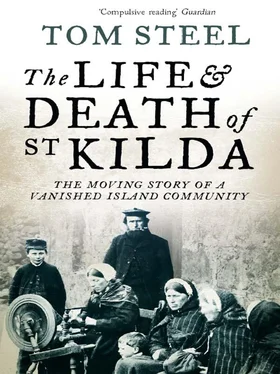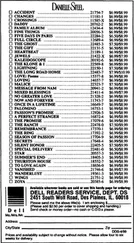His father took a last walk round the village. In many respects he had been the most important man on the island. Not only had he been sub-postmaster for many years but he had also been the factor’s representative. If the St Kildans had ever allowed one of their number authority over the rest, Neil Ferguson Senior was that man. He was the one who had called the men together when important decisions had had to be made. He had taken the Church services when the missionary was absent from the island. He was the only islander to have planted as much as a plot of potatoes that year, and was leaving the island with a heavy heart.
The corrugated iron shack bearing the crudely lettered notice ‘St Kilda Post Office’ was Ferguson’s first port of call. The target of visitors to the island eager to prove to their friends they had been to St Kilda would no longer sell the famous St Kilda postcards. Inside, papers and postcards lay strewn over the floor. On one wall was pinned a notice headed ‘What the disabled soldier wants to know’ and dated ‘War Office, August 1915’. Ferguson had often wondered why he had been sent the notice. The men of St Kilda had never in recorded history taken up arms against anyone. On 10 September 1930 the Post Office Circular announced: ‘The St Kilda Post Office was closed on 29 August, the date of the evacuation of the island. Official Records should be amended where necessary. Any letters or parcels which may come to hand for St Kilda should circulate as for Oban, where arrangements have been made for their redirection to the addressees.’
In the little schoolroom where Ferguson had received an education forty years before, a piece of linoleum still served as a blackboard. The walls were of unvarnished matchboarding. There were two school pews that could seat fifteen scholars. In each pew were mountings for inkpots. On the wall was a map of Great Britain – a map which included England at the expense of Scotland. It did not even show where St Kilda was. On the same wall was a notice that proclaimed: ‘Any scholars between the ages of three and fifteen will be exempted from payment of school fees, Harris, 14 October 1904.’ The school calendar for the year 1930 had been torn off to September. The ten schoolchildren of Hirta had had their last lessons in this small, damp room. The St Kilda School Log Book’s last entry, filled in by the missionary, was for June, and read: ‘Attendance perfect for last week (Eight). School closed today with a small treat which the children seemed thoroughly to enjoy. Today probably ends the school in St Kilda as all the inhabitants intend leaving the island this summer. I hope to be away soon.’
A door from the schoolroom opened directly on to the Church, a high-ceilinged room with windows pointed at the top in the Gothic manner. Outside the Church, from a rough wooden scaffold, hung the Church bell, salvaged from the wreck of the Janet Cowan which had come to grief on the rocks round St Kilda on 7 April 1864, while on a voyage to Dundee from Calcutta with a cargo of jute. The interior of the Church was filled by two rows of varnished deal benches with an aisle down the middle. The missionary’s pulpit was the largest to be found in the Western Isles. The previous day, when the visitors had gone, the islanders under Dugald Munro had had their last service. The St Kildans left their Bibles at their places in the pews, and the missionary left on the lectern an English and Gaelic Bible. In the shadow of the pulpit, Norman Mackinnon, the precentor and head of the largest family on the island, had led community worship for the last time.
Like all the male islanders Neil Ferguson Senior had been offered a job with the Forestry Commission. He had never seen a tree growing in his life, there being none on St Kilda; but he had agreed to go to the Tulliallan Estate and was still wondering whereabouts in Scotland that was. Some days earlier he had asked some of his fellow islanders if they knew. Someone had thought it was near Fife. As he looked at the deserted village, he remarked ‘it is like a tomb’. He closed the door of his own home. Like the other St Kildans he could not lock it. In a community in which everyone knew everyone else it had been sufficient just to shut the door against wind and rain.
The crossing to the mainland was a calm one. For as long as St Kilda could be seen on the horizon, the islanders stood silently at the stern of the boat. As the Harebell drew away from Village Bay, they showed the first signs of emotion. ‘It was really quite sad’, says Flora Gillies, then a ten-year-old schoolgirl, ‘to see the chimneys and knowing we would never be back again.’
On board the islanders were fed on salmon, beef, bread, and butter. It cost the Navy £22s 6d to provide them with a meal – a sum which they insisted on recovering as soon as possible from the Scottish Office. While the islanders ate heartily, George Henderson of the Department of Health went below to send a telegram to Tom Johnston, who was spending the weekend at his country home, Monteviot, in Kirkintilloch. ‘Evacuation successfully carried out this morning,’ wrote Henderson. ‘Left St Kilda 8 a.m.’
There was one further matter for Henderson to sort out. At the time it had not been resolved who was going to foot the bill for the evacuation. The head of every family, therefore, was obliged to sign a declaration over a sixpenny stamp, witnessed by Dr Alexander Shearer of the Home and Health Department and a representative of the Inverness County Council. By signing, the St Kildans agreed to repay the Department of Health such sums as ‘may be incurred by them regarding the removal of family, goods and effects (other than sheep), temporary accommodation in the course of removal, the purchase of furniture and furnishings for the new houses and execution of minor repairs required; also sum paid by way of maintenance until wages due to the islanders had been paid’. The sole qualification was that the total sum repayable should not exceed the money owed to the islanders by the Department of Agriculture for Scotland regarding the sheep. The authorities had thus, on the advice of the Treasury, covered themselves should questions be asked regarding the spending of British taxpayers’ money.
The feelings of the little party of civilians on board the Harebell were mixed. Some left the island gladly. Norman Mackinnon, head of a family of nine, was among those eager to leave. The previous winter the Mackinnons had almost starved, and he had told the nurse he would remove his family to the mainland that summer regardless of what other St Kildans wished to do. In so deciding, he had forced the others into petitioning the government to evacuate the whole population. Support for the evacuation had come from the other young men on the island who, like Mackinnon, were weary of the hard life on Hirta.
For Nurse Williamina Barclay, 29 August represented a small personal victory. She had been instrumental in getting the St Kildans to agree to the evacuation, and had put in three months’ hard work as the Department of Health’s official on the island. As the ship steamed towards Lochaline, her greatest reward was to feel that at long last the little children of Village Bay would have a future in life. For her work she was to be later awarded the CBE.
The elderly of St Kilda left with the saddest hearts. Many of them had never left the island before and could speak no English. As Commander Pomfret remembers, they were the only ones to show outward signs of emotion as they left behind the one way of life that they were ever to understand. ‘Nothing at all happened until they left Harebell, and then finality was reached – they had to go. Then one or two of them were weeping.’ One of the most tightly-knit communities in Britain found itself split up when the fishery cruiser arrived at Lochaline. The government had been unable to find sufficient accommodation for the thirty-six islanders in Argyll, so some had chosen to make their homes elsewhere in Scotland. At a time when few words were said, Finlay Gillies was heard to mutter to himself in Gaelic, ‘God will help us.’ Finlay MacQueen, then in his late sixties, turned to the young Neil Gillies bound for Glasgow and beyond, and said, ‘May God forgive those that have taken us away from St Kilda.’
Читать дальше












